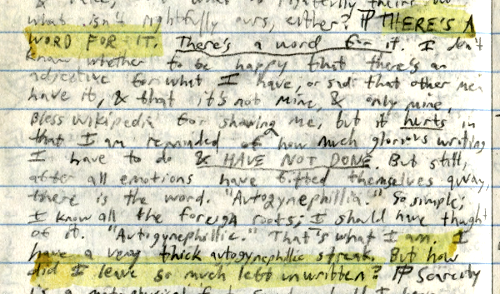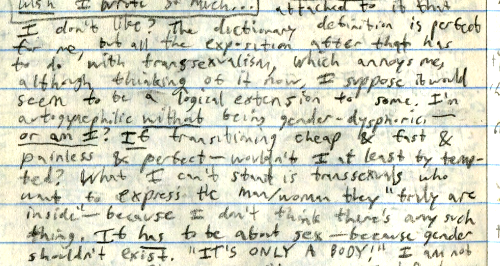A Beacon Through the Darkness; Or, Getting It Right the First Time
On 6 August 2006 (I was eighteen years old), while browsing Wikipedia (likely the 31 July revision of what is now the "Blanchard's transsexualism typology" article?), I came across the word autogynephilia for the first time, and immediately recognized that this was the word; this was the word for my thing.
I didn't know it was supposed to be controversial, and was actually surprised that it had been coined in the context of a theory of transsexualism; I had never had any reason to come up with any ludicrous rationalizations that I was somehow literally a girl in some unspecified metaphysical sense.
I wrote in my notebook:
THERE'S A WORD FOR IT. There's a word for it. I don't know whether to be happy that there's an adjective for what I have, or sad that other men have it, & that it's not mine, & only mine. Bless Wikipedia for showing me [...] But still, after all emotions have fitted themselves away, there is the word. "Autogynephilia." So simple; I know all the foreign roots; I should have thought of it. "Autogynephilic." That's what I am.

And:
Scarcity is a metaphysical fact, so why am I hurt when my word (which I didn't invent & only discovered a few hours ago) has so many connotations attached to it that I don't like? The dictionary definition is perfect for me, but all the exposition after that has to do with transsexualism, which annoys me, although thinking of it now, I suppose it would seem to be a logical extension to some. I'm autogynephilic without being gender-dysphoric—or am I? If transitioning cheap & fast & painless & perfect—wouldn't I at least be tempted? What I can't stand is transsexuals who want to express the man/woman they "truly are inside"—because I don't think there's any such thing. It has to be about sex—because gender shouldn't exist.


My views on gender have changed a lot over the past ten years—most notably, I'm not a psychological sex differences denialist anymore, so I'm afraid I can no longer endorse that "gender shouldn't exist" stance. (Given that sex differences exist and people aren't going to pretend not to notice, social-role defaults are inevitably going to accrete around them.)
The funny part is that, in retrospect, it looks like a lot of the appeal to me of psychological sex differences denialism—besides its being ideologically fashionable—was an autogynephilia-inspired rationalization: I didn't want to believe that girls were a different thing that I didn't understand. (This theme is very explicit in my writings at the time. In the same notebook, I wrote: "Heterosexuality should already imply antisexism, as people don't generally want to slander their lovers.") And the "woman I truly am inside" gender-identity narrative that I so disdained also looks like an autogynephilia-inspired rationalization, on the part of autogynephilic males (perhaps growing up in a less egalitarianist memetic environment than me) who took the other route, of successfully deluding themselves into believing that they themselves are feminine, rather than my route of successfully deluding myself into believing that femininity isn't a real thing. (Contrast to androphilic "true" transsexuals who have just been really feminine their entire lives and don't need any delusions to justify their desire to be women.)
Still, despite everything I've learned in the past decade, what's striking—at least, striking in contrast to the utter raving lunacy I see trotted about around me in the name of transgender rights—is how much I got right even then. I've had these desires since puberty, and have grown to cherish them, to let the fantasy shape my morals and ambitions. I didn't think it would be wrong to do something about it, if the costs and benefits added up. But I never took the fantasy literally, let alone expected the rest of the world to take it literally.
Ten years later, this still seems like the only sane approach.